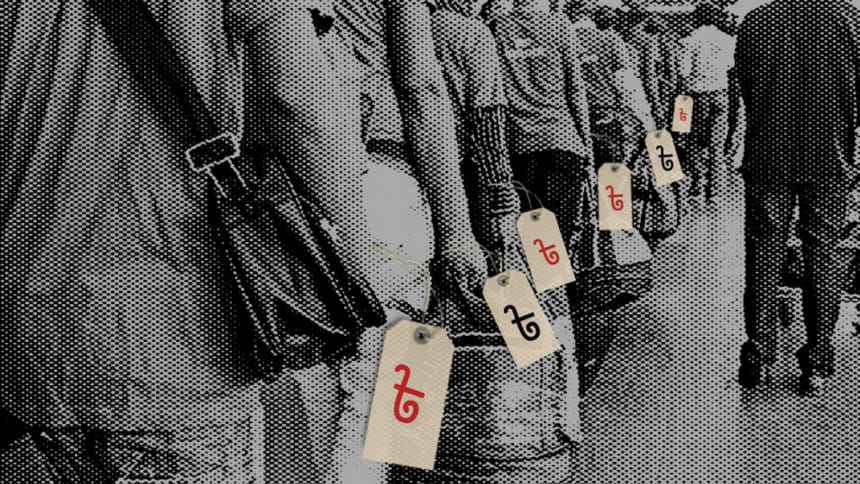Only reduced costs can end migrants’ exploitation

Rezaul Mia from Tangail spent about Tk 4.5 lakh, which he acquired through a loan, to get a labourer's job in Saudi Arabia last year. He paid most of this money to the local intermediary who processed his recruitment. Rezaul earns less than Tk 25,000 per month, and he does not know when he will be able to finish paying off his debt.
There are more than 700,000 migrant Bangladeshi workers who can relate to Rezaul's situation. Every year, Bangladeshis leave home for abroad to change their destiny. Currently, there are over 10 million Bangladeshis working abroad. Every year, they send an estimated USD 20 billion in remittance, which is six times higher than the total foreign aid the country receives, and it constitutes at least eight percent of the GDP. Last year alone, they sent over USD 22 billion in remittance to Bangladesh.
Whenever I describe Bangladesh to foreigners, I tell them, "It is a country of 'EFG,' where 'E' stands for expatriate workers, 'F' for farmers, and 'G' for garment workers." Thanks to the migrants, Bangladesh now has a foreign exchange reserve of more than USD 43 billion. But despite these contributions, our migrant workers are exploited both at home and abroad. Most of the problems they face are linked with high migration costs.
According to the World Bank and International Organization for Migration (IOM), the cost of labour migration from Bangladesh is the highest in the world, but compared to that, the income of Bangladeshi migrant workers is the lowest. The Bangladesh Bureau of Statistics (BBS) conducted a large-scale survey on the cost of migration from Bangladesh in 2020, which revealed the same fact.
According to the BBS survey, male workers spend around Tk 4.71 lakh each on average, while female workers' recruitment costs Tk 1 lakh to migrate to their countries of employment. The report says Bangladeshi workers need nearly 18 months on average to recover their migration costs.
Why is the cost so high? Because of the recruiting agencies, middlemen, and fraudulent agencies who purchase and sell visas at high prices. The migration process in Bangladesh is still driven by middlemen, who charge hefty amounts for their services. Visa trading is also a common practice where several middlemen are involved in illegal selling and buying of work visas, ultimately increasing the cost of migration.
The problem is the same in the destination countries. Once migrant workers reach there, they often face harassment in different forms, such as inhumane workload, dire living conditions, exploitation or abuses because of the high migration costs.
Though the government has fixed the migration cost for 14 countries at a maximum of Tk 1.66 lakh, in almost every case, job-seekers have to pay way more than that. According to the BBS report, the cost of migration to Singapore is Tk 5.74 lakh, Saudi Arabia Tk 4.36 lakh, Malaysia Tk 4.04 lakh, Qatar Tk 4.02 lakh, and Oman Tk 3.08 lakh.
The problem is so severe that Prime Minister Sheikh Hasina recently mentioned the high migration costs at a cabinet meeting and asked the relevant officials to deal with these issues and stop the exploitation of migrant workers.
How can the migration costs be reduced? Of course, awareness has a role to play, but first of all, the entire migration process must be digitalised. See, most of the recruiting agencies are in Dhaka. If a worker from Tangail wants to go abroad, he has to go to a middleman in his area. This needs to be addressed.
Registration on a digital platform can be a good alternative to middlemen. If anyone wants to go abroad, they would have to register, and the digital platform would create a functional database according to their skills. Then the agencies can hire potential migrants according to their skills listed in the database.
Of course, this is not a new idea. According to the Overseas Employment and Migrant Act, this should have been initiated in 2013. The recruiting agencies always complain that they don't find qualified workers from the database of the Bureau of Manpower, Employment and Training (BMET), so they have to depend on middlemen. BMET says it is currently trying to make a strong database through an app, and such a digitalisation process can reduce the migration cost.
On the other hand, those who are going abroad from Bangladesh are not very conscious, and they want to go at any cost. This practice is dangerous. Before going abroad, everyone should calculate how much money they can earn and what their migration cost is. The government, NGOs and other stakeholders can work together to make people aware of the risks and consequences before they decide to go abroad.
Another big reason for the high migration cost is unskilled labour. Potential migrants from Bangladesh are ready to pay much higher costs, rather than spend a little portion of that on skills training. Skills training must get priority. Particularly, after Covid-19 and due to the Fourth Industrial Revolution, there is a huge demand for skilled workers. We have to start preparing for that now.
To reduce migration costs, there is no alternative to strong government monitoring. The government can fix realistic migration costs. Migration costs are mostly divided into three parts. The first consists of various government fees, such as registration fees, welfare fees, smart card fees, etc. These costs are fixed no matter where the workers go. The second type of cost varies from country to country, such as visa fees, work permit fees, attestation fees, etc. The last part includes costs like airfare, which can always change.
However, for ethical recruitment, rather than fixating on the migration costs, we must also be vocal about employers' pay models. If there is a need for an employee, it is the responsibility of the employers to bear the recruitment costs. To establish this, negotiations need to take place globally.
Admittedly, there are many achievements in the country's migration sector, and the government has taken various positive initiatives. But there is still a long way to go, especially to reduce the migration costs, and it is never possible without all the stakeholders working together. We must understand that if the migration cost is not reduced, the problems that our migrant workers face will never end.
Shariful Hasan is the head of the Migration Programme at Brac.

 For all latest news, follow The Daily Star's Google News channel.
For all latest news, follow The Daily Star's Google News channel. 



Comments